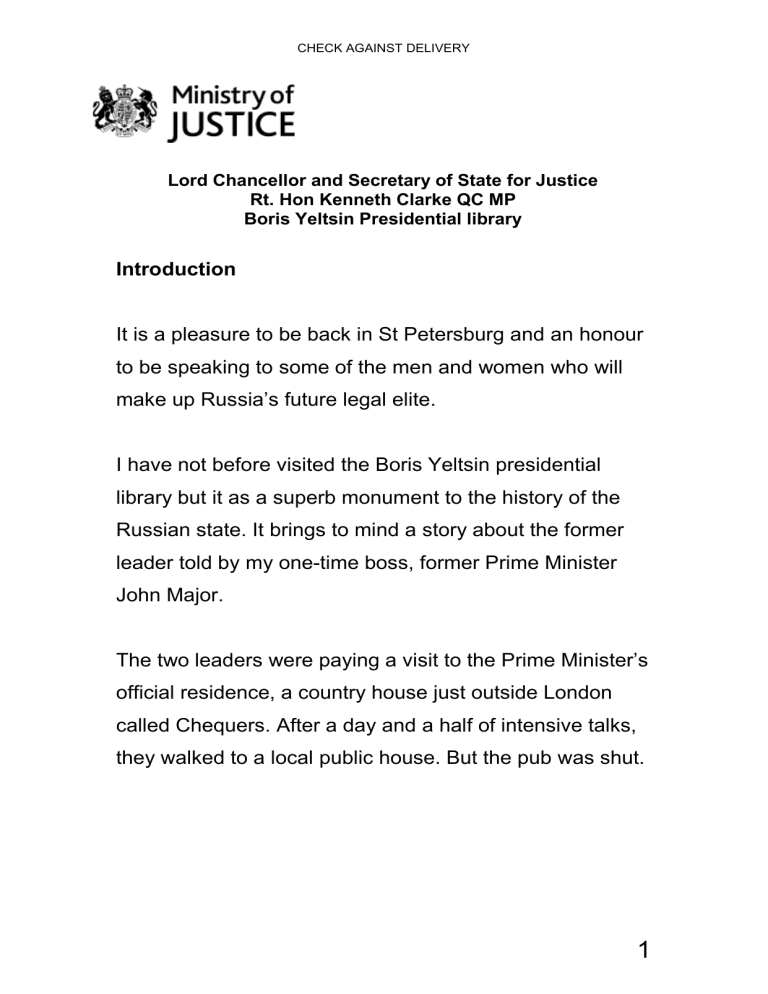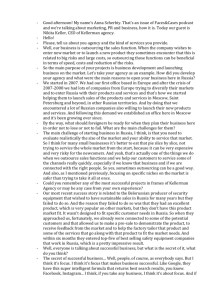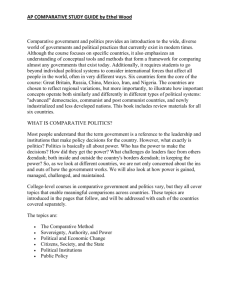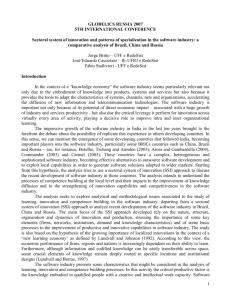Rule of law speech delivered by the Lord Chancellor and Secretary
advertisement

CHECK AGAINST DELIVERY Lord Chancellor and Secretary of State for Justice Rt. Hon Kenneth Clarke QC MP Boris Yeltsin Presidential library Introduction It is a pleasure to be back in St Petersburg and an honour to be speaking to some of the men and women who will make up Russia’s future legal elite. I have not before visited the Boris Yeltsin presidential library but it as a superb monument to the history of the Russian state. It brings to mind a story about the former leader told by my one-time boss, former Prime Minister John Major. The two leaders were paying a visit to the Prime Minister’s official residence, a country house just outside London called Chequers. After a day and a half of intensive talks, they walked to a local public house. But the pub was shut. 1 CHECK AGAINST DELIVERY Mr Yeltsin's indignant aides hammered on the door shouting: "Open up - it is the President of Russia". And a voice inside replied: "Yes - and this is the Kaiser speaking." The landlord was eventually persuaded not to venture further in endangering UK-Russian relations, but it was a close run thing. I doubt that that occasion – sometime in the early 90s was the first, or the last time, our two nations have misunderstood each other. And the relationship between Britain and Russia continues to have its ups and downs. But as the current British Prime Minister, David Cameron, argued last September in Moscow, we are countries that share a great deal, and face common challenges. It’s right that we should acknowledge genuine differences where they exist, but I believe we are stronger working together for the common good where possible. 2 CHECK AGAINST DELIVERY One area of fundamental important to the common good – and my theme for today – is the central place of the law in modern society if we are to flourish. Backdrop - economic and political crisis The world is facing real turbulence at the moment. The global economy is only just emerging from what have been some of the worst economic storms of my lifetime. Events in the eurozone over recent days and continuing weak growth are raising doubts about whether international policy-makers have really got to grips with the crisis. This comes against the backdrop of a remarkable period of political change in the Middle East, as people frustrated at the lack of opportunity open to them have risen up and made their feelings clear. The question this combination of factors highlights for me is how do we respond to the common human desire for progress, opportunity and prosperity, at a time when the capacity of the world economy to deliver is under threat? 3 CHECK AGAINST DELIVERY We need to do more on trade Expanding wealth and opportunity is partly about trade, and there is no doubt we should redouble our efforts. There is a natural fit between Britain and Russia in matters of commerce because our relative strengths are complementary. The UK is strong in services, but light on resources. Russia is strong in resources, but lighter on services. It’s fitting then that our business links run deep. The UK is consistently the largest foreign direct investor in Russia with cumulative investments of almost £30bn whilst Russian firms account for 13% of all international IPOs on the London Stock Exchange. The value of exports between us rose 40% last year. But the underlying challenge remains rule of law But I also think we need to look at the deeper challenges in our societies – the things that are getting in the way of ordinary people’s aspirations. I believe that across the globe one important set of factors retarding growth and frustrating publics is the waste and uncertainty caused by inadequate justice systems and weak rule of law. 4 CHECK AGAINST DELIVERY In the absence of clear rules, widely understood and properly enforced, people aren’t secure or free, but are too often subject to someone else’s arbitrary power. This matters in itself. But it’s also a cause of unfairness and inefficiency. The economic case is that commerce and investment requires predictability. Investment will only flow competitively if there is confidence that contracts will be enforced and that assets are protected; that courts are impartial; that cases can be resolved quickly. Some say modernising and opening up undermines stability and prosperity. But that’s the wrong way round. Modernisation and protection of human rights – delivering real freedom of speech, assembly, political association and so on - is the only true guarantee of stability and prosperity. So progress on the rule of law is fundamentally important: it’s in the interest of everyone, because it is the sure path to stable, prosperous societies. 5 CHECK AGAINST DELIVERY The challenge for rule of law of course is not the absence of good intentions. It’s how to deliver on them in practice. The UK experience Let me share the UK experience. Britain is proud of its legal heritage. London is known for its high quality, polyglot commercial sector, with a strong record of judicial independence and expertise. The open, globalised services that we offer – from litigation to emerging fields like arbitration and mediation - play a fundamental role in oiling the wheels of the economy in Russia as elsewhere. I hope that some of you will get first experience of it yourselves as your careers develop. But our broader system is far from perfect and we’ve been reforming our system in order to ensure that it works for the public. 6 CHECK AGAINST DELIVERY Human rights First, on human rights where we came together with other Member States of the Council of Europe last month, including Russia, to agree changes to the European Convention and the European Court in Strasbourg. Britain is a staunch supporter of the fundamental freedoms embodied in the European Convention. Indeed, British lawyers help draft it in the aftermath of World War II and we’re proud that 40 countries in Europe and beyond now subscribe to those basic protections. But that doesn’t mean we’ve always had an easy relationship with the European Court in Strasbourg, and we do periodically lose cases. The media gets hot under the collar when a decision by the British government is overturned. The press likes to act as if the UK is being unfairly singled out, or could just ignore legal judgements. So I spend much of my time pointing out that being found in breach by judges is part of the normal process of the rule of law. 7 CHECK AGAINST DELIVERY Even established democracies are prone to the tyranny of executive power, and a basic set of standards enforced by a wholly independent judiciary is a vital protection of the values we hold dear. In other words, respecting the rule of law and human rights doesn’t undermine great nations; it is what makes nations great. That doesn’t mean everything is perfect in Strasbourg. We’ve recently made the argument that the Court remains overloaded and needs reform to ensure it can focus on the most serious violations. The Brighton Declaration should result in a Court that intervenes less frequently where cases are dealt with properly at national level. But the quid pro quo of reformed international institutions is that national governments do their bit to ensure rights are more strongly respected. We take that seriously in the UK and remain committed to the highest standards. 8 CHECK AGAINST DELIVERY Bribery A second focus of reform is bribery – an area where, until recently, we’d fallen behind, with out of date laws. We’ve remedied this state of affairs by introducing the Bribery Act - a new regime that brings us into line with the strongest standards in the world and sends out a clear signal that it is unacceptable for British-based firms to bribe. And, contrary to fears when we introduced it, it is proving a boon, not a burden to business. The reason is that firms are – directly or indirectly - often victims of corruption. Operating in a legal system where they have a good reason not to pay bribes ultimately saves them money, protects their reputation and allows firms to attract ethical investment. It also means businesses have some redress if competitors aren’t so honest. 9 CHECK AGAINST DELIVERY So, the Act is not just delivering an ethical premium. It is offering a rejoinder to those who say we have to choose between fair competition and business success. Russia’s reforms On human rights, and on bribery then Britain has been seeking reform. Russia of course has its own challenges, and this nation has also been undertaking improvements – whether via legislation criminalising foreign bribery, ratification of the OECD Convention, or the landmark moment of accession to the World Trade Organisation last December. These are all positive steps. Britain welcomes the commitments made by President Putin and Prime Minister Medvedev to address corruption and promote judicial independence. Further progress on these reforms is important to increase the confidence of British and other investors in Russia. But there is a much wider significance for Russian society. 10 CHECK AGAINST DELIVERY As the future Russian legal elite, it will fall to you – the people in this room – to ensure that Russian citizens are able to enjoy their full rights, by which I mean the common European standards of the Convention. This includes ensuring that legislation and law enforcement do not discriminate on the grounds of ethnicity or sexual identity, and that court systems do not allow political interference or institutional bias. No small task in any country, but I believe you will be equal to this challenge. Conclusion As both our nations continue on the journey of reform, the UK wants to work together in our shared national interest. Our countries already work together closely commercially, of course. International legal firms and specialist services offered out of London are helping Moscow emerge as a leading financial centre and modernising St Petersburg’s infrastructure. 11 CHECK AGAINST DELIVERY But rule of law needs to extend further and deeper if our countries are to thrive. I hope we can build on existing bilateral cooperation and continue towards a stronger partnership still. For it is only by making progress together than we can secure the greater prosperity, and freedom, that our people want. There is little to lose, and much to gain. END 12











